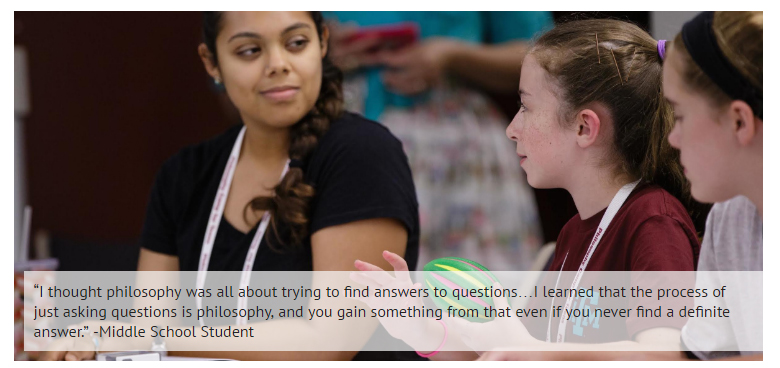Details On Starting and Running a Pre-College Philosophy Camp
The Philosophy Learning and Teaching Organization, PLATO, “advocates and supports introducing philosophy to children and youth through programs,
resource-sharing, and the development of a national network in pre-college philosophy.” They’ve recently posted an interview, conveniently organized by topic, with Texas A&M philosophy professor Claire Katz and English PhD student Desirae Embree, in which they lay out the details on starting and running a week-long philosophy camp for middle-school and high-school students.
Why create a pre-college philosophy camp? Professor Katz says:
Although part of our aim was to enhance the intellectual life of these kids, we had a simultaneous aim—a long game—to change how philosophy is viewed and, ultimately, to change the face of philosophy as a discipline. We believe that by introducing philosophy to younger people, they might see philosophy as an option to pursue academically where they might not have otherwise.
Some of the details about running the camp are interesting:
Philosophically, we began everyday with a reading from Plato, and everyday we ended with a contemporary theme that picked up on a question Plato had raised 2,500 years before…
On the first day, we began our philosophical discussions with an animated video of Plato’s Cave Allegory. The themes from that discussion stayed with them all week and several campers indicated that their lingering questions related to knowing what their own chains were.
And it sounds like it went very well. For example:
We were blown away by how respectful the kids were to one another. Even though they came from very different backgrounds and each held very different perspectives on the subjects we discussed, they treated one another as legitimate contributors to the conversation. Anyone who has spent a significant amount of time with preteens and teens will know how impressive this is: not one eye was rolled. When a divergent perspective was offered, it was given careful consideration, and it was ideas that were debated—not the people advancing them.
The full interview is here.



Prof. Katz, Ms. Embree, and PLATO, you’ve made my day! You’ve shown that philosophizing with children and youths reveals possibilities beyond the self-absorbed, the trivial, the despondent, or the humdrum. Far from a mere luxury, these experiences can be a source of fulfillment that reverberates through their lives. These kids have had a hopeful reminder that they are not limited to merely passing through. The greatest challenge is to make such opportunities available to all.
Thank you so much Steven! If you are interested in learning more about Philosophizing with Children and PLATO (philosophy learning and teaching organization) please feel free to reach out to me at [email protected]
Awesome! I’d like to connect with folks from PLATO. As a philosopher and founder of successful youth camps, I’d love to learn more, and perhaps even get involved. Professor Katz, Ms. Embree, please drop me an email if you get a chance! [email protected]
Hi Andy! Thanks so much for the comment. PLATO just sent you an email at the address provided. I hope we can connect!!